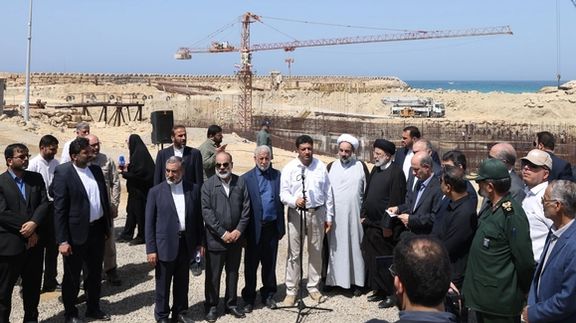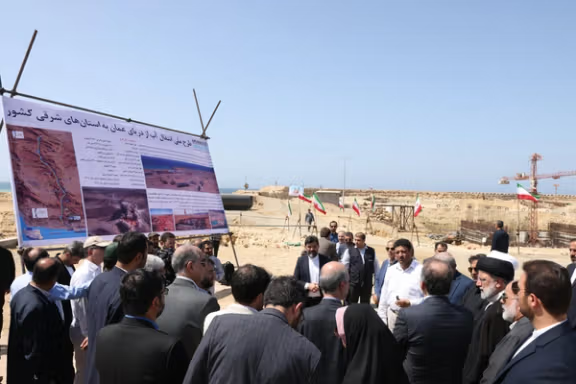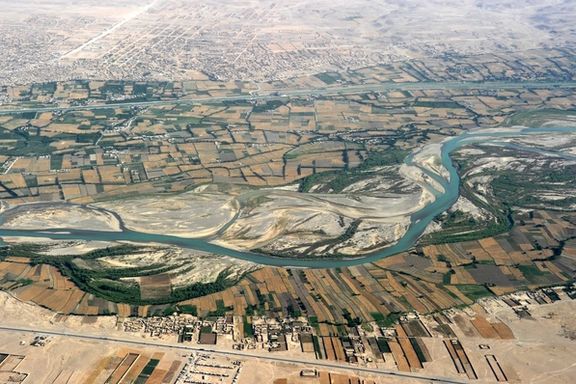Share Water, Iran’s President Warns Taliban Amid Rising Tension

Iran's president has warned the Taliban to share water from the Hirmand River in the latest episode of a long-running dispute.

Iran's president has warned the Taliban to share water from the Hirmand River in the latest episode of a long-running dispute.
Flowing 700 miles, the river – also known as Helmand – enters Iran's Hamoun wetlands in the Sistan-Baluchestan province after originating in the Hindu Kush Mountains near Kabul. Lake Hamoun used to be one of the world's largest wetlands, straddling 4,000 square kilometres (1,600 square miles) between Iran and Afghanistan.
The river constitutes more than 40% of Afghanistan’s surface water, according to water experts, and runs about 1,125km (700 miles) southwest from the Hindu Kush mountains into Iran. The River, which both Afghanistan and Iran depend on for agriculture and drinking water, has been their biggest source of tension for years.
Over the years, Iran has accused Afghanistan of restricting the flow of water from the river by building dams over it, a charge that Afghan authorities deny.
Speaking on Thursday on a visit to the southeastern Sistan and Baluchestan province – a deprived region where the water is desperately needed – President Ebrahim Raisi warned the Taliban: "Take my words seriously so that you don't complain later."Sistan-Baluchestan is the most deprived region of Iran.
"Afghanistan's rulers should allow our experts to come and check the truth of the matter. If our experts confirm a lack of water, we have nothing to say, otherwise we will not allow the rights of our people to be violated in any way," he added.
During his visit, Raisi also inaugurated a project to supply water from the Gulf of Oman to eastern cities of the country, including to more than 150 villages across the Sistan-Baluchestan province.
The new water supply project would take water from the Persian Gulf and Gulf of Oman to the provinces of Sistan-Baluchistan, South Khorasan and Razavi Khorasan via a 1,700-kilometer pipeline.
It has been criticized by experts as another measure by the government that would aggravate the situation, with environmentalist Kaveh Madani describing it as detrimental to unique ecosystem of the Persian Gulf region.

Iran's Foreign Minister Hossein Amir-Abdollahian recently said that the Afghan side has claimed the dam built over Hirmand does not have enough water.
Calling on Afghan authorities to let the water flow, he said, "Our clear request from the Afghan side is to open the gates of the Kajaki Dam before the time is lost," he said.
An agreement between Tehran and Kabul in 1973 stipulated that Afghanistan had to allow Iran an average of 556,000 acre-feet or 820 million cubic meters of water per year.Afghanistan must deliver water from the Helmand River to Iran at a rate of 22 cubic meters per second per annum (normal water year) with an additional four cubic meters per second for “goodwill and brotherly relations.”
Earlier in the month, the Iranian president's special envoy for Afghan affairs, Hassan Kazemi Qomi, only 27 million cubic meters of water reached Iran last year that is a small fraction of how much Iran is entitled to under the water-sharing treaty.
“The issue of the (1973) treaty is a legal issue, to which the Afghan government is committed and has declared its adherence. It must also implement the treaty,” he said.
Iranian Energy Minister Ali Akbar Mehrabian has also recently said that the government is taking "serious steps" to ensure proper implementation of the treaty, adding that Taliban authorities in Kabul are committed to the water-sharing treaty.
The previous Afghan government stopped the flow of water to Iran after inaugurating the Kamal Khan Dam, in Nimroz province in 2021.

At the inauguration of the dam, ex-President Ashraf Ghani, pledged to stick by the 1973 agreement over Hirmand waters, saying that Kabul wanted to trade water for oil. “Afghanistan would no longer give free water to anyone, so Iran should provide fuel to Afghans in exchange for water,” he said.
In late July 2022, Amir-Abdollahian also warned his Taliban counterpart, Amir Khan Muttaqi, that prohibiting Tehran from its rightful access to the Helmand River will only cause further strain to already tattered ties.
Afghanistan argues that complaints about improper allocation of water were made when the Helmand River Basin was under drought which severely reduced the river’s water flow, with Afghani pundits claiming that Iran had been receiving more water during normal and above-normal water years.
One way to solve the issue, as foreseen in the Helmand River Treaty in 1973, is that the two neighboring countries jointly determine places of delivery and construct joint hydrometric stations, regulating their water share more strictly.
In August 2022, Afghanistan and Iran agreed on a timeline for the construction of joint hydrometric stations, but such projects will take years to complete.